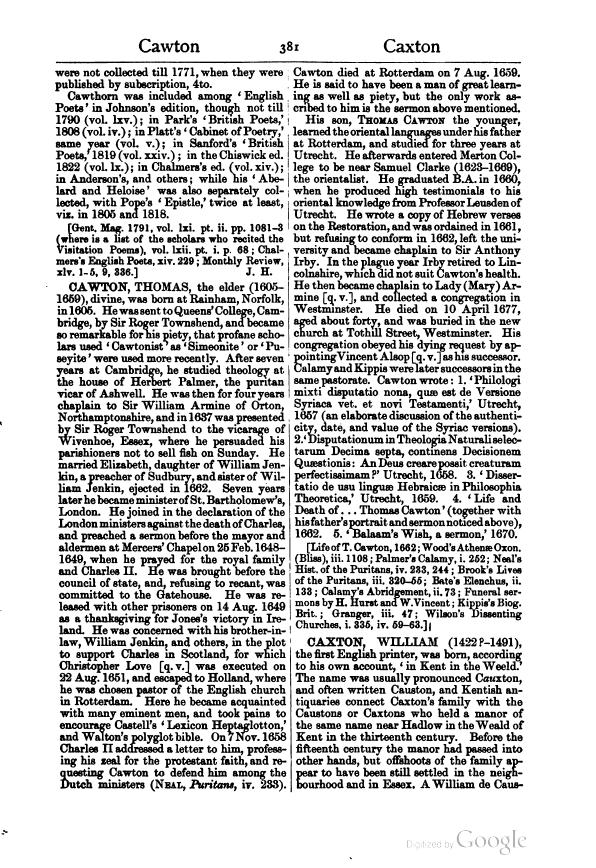were not collected till 1771, when they were published by subscription, 4to.
Cawthorn was included among ‘English Poets’ in Johnson's edition, though not till 1790 (vol. lxv.); in Park's ‘British Poets,’ 1808 (vol. iv.); in Platt's ‘Cabinet of Poetry,’ same year (vol. v.); in Sanford's ‘British Poets,’ 1819 (vol. xxiv.); in the Chiswick ed. 1822 (vol. lx.); in Chalmers's ed. (vol. xiv.); in Anderson's, and others; while his ‘Abelard and Heloise’ was also separately collected, with Pope's ‘Epistle,’ twice at least, viz. in 1805 and 1818.
[Gent. Mag. 1791, vol. lxi. pt. ii. pp. 1081–3 (where is a list of the scholars who recited the Visitation Poems), vol. lxii. pt. i. p. 68; Chalmers's English Poets, xiv. 229; Monthly Review, xlv. 1–5, 9, 336.]
CAWTON, THOMAS, the elder (1605–1659), divine, was born at Rainham, Norfolk, in 1605. He was sent to Queens' College, Cambridge, by Sir Roger Townshend, and became so remarkable for his piety, that profane scholars used 'Cawtonist' as 'Simeonite' or 'Puseyite' were used more recently. After seven years at Cambridge, he studied theology at the house of Herbert Palmer, the puritan vicar of Ashwell. He was then for four years chaplain to Sir William Armine of Orton, Northamptonshire, and in 1637 was presented by Sir Roger Townshend to the vicarage of Wivenhoe, Essex, where he persuaded his parishioners not to sell fish on Sunday. He married Elizabeth, daughter of William Jenkin, a prencher of Sudbury, and sister of William Jenkin, ejected in 1662. Seven years later he became minister of St. Bartholomew's, London. He joined in the declaration of the London ministers against the death of Charles, and preached a sermon before the mayor and aldermen at Mercers' Chapel on 25 Feb. 1648-1649, when he prayed for the royal family and Charles II. He was brought before the council of stale, and, refusing to recant, was committed to the Gatehonse. He was released with other prisoners on 14 Aug. 1649 as a thanksgiving for Jones's victory in Ireland. He was concerned with his brother-in-law, William Jenkin, and others, in the plot to support Charles in Scotland, for which Christopher Love [q. v.] was executed on 22 Aug. 1651, and escaped to Holland, where he was chosen pastor of (he English church in Rotterdam. Here he became acquainted with many eminent men, and took pains to encourage Castell's 'Lexicon Heptaglotton,' and Walton's polyglot bible. On 7 Nov. 1658 Charles II addressed a letter to him, professing his zeal for the protestant faith, and requesting Cawton to defend him among the Dutch ministers (Neal, Puritans, iv. 255). Cawton died at Rotterdam on 7 Aug. 1659. He is said to have been a man of great learning as well as piety, but the only work ascribed to him is the sermon above mentioned.
His son, Thomas Cawton the younger, learned the oriental languages under his father at Rotterdam, and studied for three years at Utrecht. He afterwards entered Merton College to be near Samuel Clarke (1623-1669), the orientalist, He graduated B.A. in 1660, when he produced high testimonials to his oriental knowledge from Professor Leusden of Utrecht. He wrote a copy of Hebrew verses on the Restoration, and was ordained in 1661, but refusing to conform in 1662, left the university and became chaplain to Sir Anthony Irby. In the plague year Irby retired to Lincolnshire, which did not suit Cawton's health. He then became chaplain to Lady (Mary) Armine [q. v.], and collected a congregation in Westmmster. He died on 10 April 1677, aged about forty, and was buried in the new church at Tothill Street, Westminster. His congregation obeyed his dying request by appointing Vincent Alsop [q. v.] as his successor. Calamy and Kippis were later successors in the same pastorate. Cawton wrote: 1. 'Philologi mixti disputatio nona, quæ est de Versione Syriaca vet. et novi Testamenti,' Utrecht, 1657 (an elaborate discussion of the authenticity, date, and value of the Syriac versions). 2.'Disputationum in Theologia Naturali selectarum Decima septa, continens Decisionem Quæstionis: An Deus creare possit creaturam perfectissimam' Utrecht, 1658. 3. 'Dissertatio de usu linguæ Hebraicæ in Philosophia Theoretica,' Utrecht, 1659. 4. 'Life and Death of ... Thomas Cawton ' (together with his father's portrait and sermon noticed above), 1662. 5. 'Balaam's Wish, a sermon,' 1670.
[Life of T. Cawton, 1682; Wood's Athenæ Oxon. (Bliss), iii. 1108; Palmer's Calamy, i. 252; Neal's Hist, of the Puritans, iv. 233. 244; Brook's Lives of the Puritans, iii. 330-55; Bute's Elenchus, ii. 133; Calamy's Abridgement, li. 73; Funeral sermons by H. Hurst and W. Vincent; Kippis's Biog. Brit.; Granger, iii. 47; Wilson's Dissenting Churches. i. 335. iv. 59-63.]
CAXTON, WILLIAM (1422?–1491), first English printer, was born, he himself states, ‘in Kent in the Weeld’. The name was usually pronounced Cauxton, and often written Causton, and Kentish antiquaries connect Caxton's family with the Caustons or Caxtons who held a manor of the same name near Hadlow in the Weald of Kent in the thirteenth century. Before the fifteenth century the manor had passed into other hands, but offshoots of the family appear to have been still settled in the neighbourhood and in Essex. A William de Caus-
